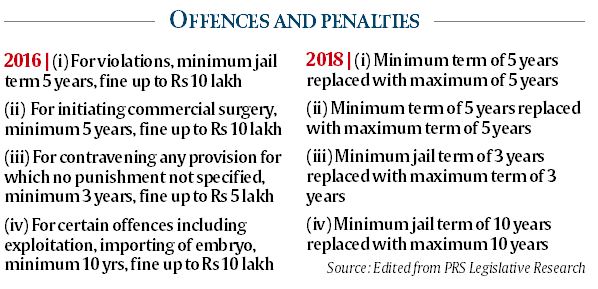Context:
- Lok Sabha passed the Surrogacy (Regulation) Bill, 2016. Cleared by the Cabinet in 2016, the Bill was subsequently referred to a Parliamentary Standing Committee (Health & Family Welfare) before its passage. A look at its journey, the issues raised along the way, and which of these it addresses and which of these it does not:
What does the Bill aim to do?
- The Bill had been cleared by the Cabinet — the Bill allows only altruistic surrogacy (by relatives) for married couples. It seeks to put an end to commercial surrogacy — payment to a surrogate mother is punishable by up to five years imprisonment — and also has safeguards built in against sex selection of the baby.
- The Bill proposes to allow altruistic, ethical surrogacy to intending infertile Indian married couples between the ages of 23-50 (female) and 26-55 (male).
- It limits the option to only legally married childless couples who have been trying for a child for at least five years.
- The commissioning couple cannot have a surviving child either biological or adopted, except when they have a child who is mentally or physically challenged or suffers from a life-threatening disorder with no permanent cure.
Why was the Bill necessary?
- There have been several reports about the exploitation of surrogate mothers, women who are kept confined in “hostels” during pregnancy and not allowed to meet their families, women who do it repeatedly for a paltry amount thus putting their own bodies at risk. The Bill seeks to put an end to that.
- Ballpark estimations by Indian Council of Medical Research are around 2,000-odd babies per year through commercial surrogacy — when a woman is paid a pre-fixed sum for renting her womb. CII figures say surrogacy is a $2.3 billion industry fed by lack of regulation and poverty.
- The 228th report of the Law Commission had recommended prohibition of commercial surrogacy.
- Commercial surrogacy is allowed only in Russia, Ukraine and California. The Bill now requires all surrogacy clinics to be registered.
- Clinics can charge for these services but the surrogate mother cannot be paid. The national and state surrogacy boards will be the regulating authorities.

What maternity benefits would a commissioning mother be entitled to?
- The Bill does not take that into account. It deals with the rights and responsibilities of commissioning parents and surrogate mother vis a vis each other and the baby, but does not address entitlements of a commissioning parent from his or her employer.
- These are covered by labour laws; the law on maternity benefits does not take into account the possibility of a woman becoming a mother without actually giving birth.
Is the Bill newly passed different from the one cleared by the Cabinet in 2016?
- There are changes, including a reduction of punishment.
- The earlier version provided for a minimum jail term of 10 years for some offences; the present one sets a maximum of 10 years.
- The present Bill forbids the surrogate mother to use her own gametes (eggs), gives her the option to withdraw before the embryo is implanted, and puts a condition for obtaining a “certificate of essentiality” that the intending couple needs —they must provide a 16-month insurance coverage for the surrogate mother including postpartum complications. The Bill did not make several changes sought by the Standing Committee.

What were these recommendations?
- Pointing out that the Supreme Court has recognised live-in relationships, the Standing Committee had recommended that the government “broadbase the eligibility criteria in this regard and widen the ambit of persons who can avail surrogacy services by including live-in couples, divorced women/ widows”.
- It had countered the “altruistic surrogacy for married couples” argument and recommended that compensation be the norm and the word altruistic should be replaced with compensated.
- Altruistic surrogacy, it observed, is tantamount to exploitation. “Permitting women to provide reproductive labour for free to another person but preventing them from being paid for their reproductive labour is grossly unfair and arbitrary…altruistic surrogacy is another extreme and entails high expectations from a woman willing to become a surrogate without any compensation or reward but a decision based on noble intentions and kindness,” the report said.
Source:IE
